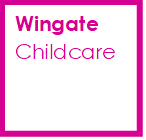WINGATE CHILDCARE

Looking after your Child's Teeth
Believe it or not, tooth decay is one of the top reasons children under five years old are admitted to the hospital. The good news, however, is that tooth decay is easily preventable. Preventing tooth decay and looking after your child’s oral health stems from creating good habits at an early age. Therefore, children should learn the importance of looking after their teeth and maintaining good oral hygiene as early as possible.
How to Promote Good Oral Health
Promoting good oral health starts when children are babies, and it is at this age that good habits form.
Below is some advice for babies and older children based on Public Health England (PHE) recommendations.
Babies
PHE recommends that:
-
Breast or formula milk is the only food or drink babies need for around the first 6 months of their life.
-
Bottle-fed babies should drink from a free-flow cup from 6 months, and bottle-feeding should be discouraged from around 12 months.
-
Babies should have only breast or formula milk or cooled boiled water in bottles.
-
Only milk or water should be drunk between meals, and adding sugar to foods or drinks should be avoided.
Older Children
PHE recommends that parents/carers should:
-
Reduce the quantity and frequency of foods and drinks that contain sugar and only give sweet foods and dried fruit at mealtimes.
-
Squash sweetened with sugar, fizzy drinks, soft drinks, and juice drinks have no place in a child’s daily diet.
-
Limit the amount of fruit juice and smoothies your child drinks to a maximum of 150 ml (1 portion) per day and drink it with meals to reduce the risk of tooth decay.
-
Always ask for sugar-free medicines.
When to Start Brushing your Child's Teeth
Brushing children’s teeth should begin as soon as teeth start to appear. A bristled brush will suffice for your baby’s first teeth at the very earliest stage. You will also need to purchase baby-friendly toothpaste. Many babies don’t like minty toothpaste, so you may want to consider a fruity flavour instead.
Once your child reaches 18+ months, it will be time to introduce a more age-appropriate toothbrush. Again, you may need to research to find a brush with soft bristles.
Top Tips for Teeth Brushing!
It would be best to support your children up to 7 years old with their teeth brushing to ensure no mouth areas are missed unless you feel they can brush their teeth independently.
Some things you can do to support your child are:
-
Brush teeth once in the morning and again before bedtime
-
Guide your child’s hand so they can feel the correct movement
-
Brush for around two minutes
-
Use a mirror to help your child see where the brush is cleaning their teeth.
-
Make tooth brushing as fun as possible by singing a song or using an egg timer to time it for about 2 minutes.
-
Don’t let children run around with a toothbrush in their mouth, as they may have an accident and hurt themselves.
How Diet Impacts Children's Oral Health
As adults, we know that the foods we consume impact our health, including our teeth. Good habits from a young age will last well into children’s adult lives. Educating children on making healthy choices with food and drink is also essential.
Reducing sugar intake is critical when maintaining good oral hygiene. As we know, sugar is the leading cause of tooth decay. Checking food labels for sugar content is an easy way of understanding if something contains lots of sugar and may support you in making healthier choices.
Drink
Children should only be offered milk or water as their drink option as part of their diet. Many parents will often tell us that their children won’t drink water. However, if water is the only drink offered when babies begin to wean, then this is something that they naturally adopt.
However, if sugary or juice drinks are offered, children will naturally prefer these because they are sweeter in taste. This becomes problematic when children cannot have these drinks at nursery or school.
Make Regular Visits to the Dentist
The guidance advises that children as young as 6 months old have their first trip to the dentist. By this time, your child’s first teeth may come through. By taking children to the dentist this young, they become used to having their check-ups and become accustomed to the environment.
The dentist can also advise you on preventing tooth decay and identify any early problems your child may be experiencing.
It is also worth noting that NHS dental care for all children under 18 is free across England, so you do not need to worry about expenses due to visiting the dentist.
It’s important that you make your child’s visit to the dentist fun. Being positive about going and offering an incentive, like a sticker if they are brave for the dentist, can be a great way to encourage children to feel more cooperative.